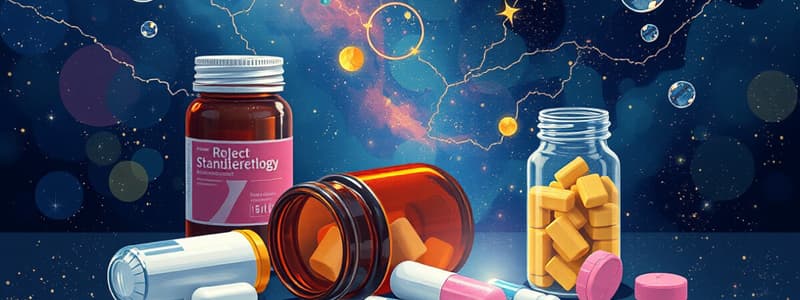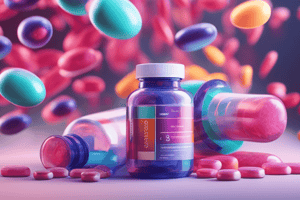Podcast
Questions and Answers
Which of the following are classifications of medications used as mood stabilizers? (Select all that apply)
Which of the following are classifications of medications used as mood stabilizers? (Select all that apply)
- Aniconvulsants (correct)
- Antipsychotics (correct)
- Antidepressants
- Lithium (correct)
What is the rationale for prescribing an antipsychotic when starting lithium therapy?
What is the rationale for prescribing an antipsychotic when starting lithium therapy?
Antipsychotics control hyperactivity until the lithium can kick in.
What is the therapeutic range for lithium carbonate?
What is the therapeutic range for lithium carbonate?
0.5-1.5
What are the initial signs and symptoms of lithium toxicity?
What are the initial signs and symptoms of lithium toxicity?
List some nursing implications for a client on lithium therapy.
List some nursing implications for a client on lithium therapy.
Flashcards
Anticonvulsants
Anticonvulsants
Medications used as mood stabilizers.
Antipsychotic rationale in lithium therapy
Antipsychotic rationale in lithium therapy
Antipsychotics control hyperactivity until lithium reaches therapeutic levels.
Lithium therapeutic range
Lithium therapeutic range
0.5-1.5 mEq/L
Initial signs of lithium toxicity
Initial signs of lithium toxicity
Signup and view all the flashcards
Nursing implications for lithium therapy
Nursing implications for lithium therapy
Signup and view all the flashcards
Study Notes
Mood Stabilizers Overview
- Lithium: Serves as an antimanic medication, primarily utilized for mood stabilization.
- Anticonvulsants: Important for mood stabilization; require monitoring of blood levels, liver, and kidney function.
- Antipsychotics: Used alongside other medications to manage mood disorders.
Rationale for Antipsychotic Use
- Antipsychotics help control hyperactivity and symptoms before lithium takes effect.
- Lithium typically requires 1-3 weeks for full therapeutic effects.
Lithium Therapeutic Range and Toxicity
- Therapeutic Range: Effective serum lithium levels are between 0.5-1.5 mEq/L.
- Signs of Lithium Toxicity: Initial symptoms may include:
- Blurred vision
- Ataxia (impaired coordination)
- Tinnitus (ringing in the ears)
- Nausea and vomiting
- Severe diarrhea
Nursing Implications for Lithium Therapy
- Encourage adequate hydration: 6-8 glasses of water daily to prevent dehydration and toxicity.
- Ensure patient safety: Protect clients from self-harm risks.
- Regular monitoring: Check lithium serum levels frequently to ensure they remain within the therapeutic range.
- Monitor sodium intake: Ensure adequate dietary sodium to maintain lithium efficacy.
- Administer medication with food: This can help reduce gastrointestinal side effects.
Studying That Suits You
Use AI to generate personalized quizzes and flashcards to suit your learning preferences.



